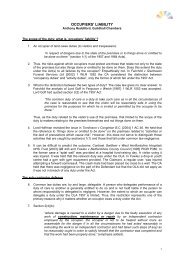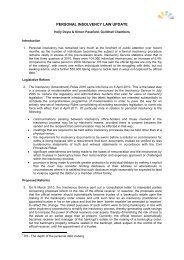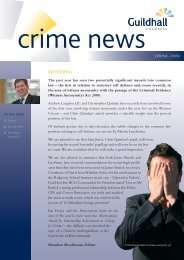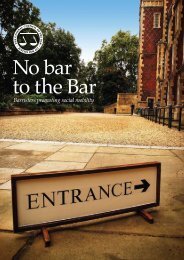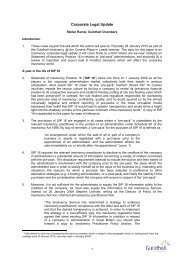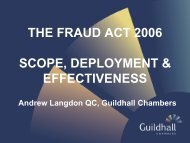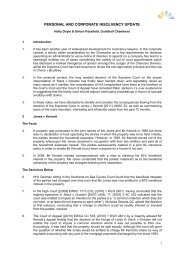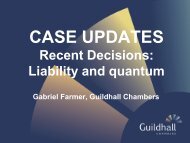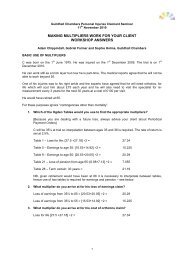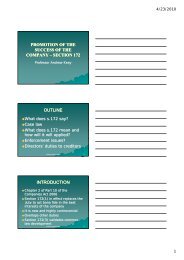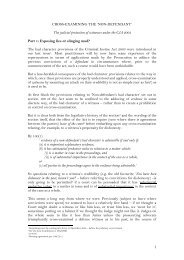Personal and Corporate Update - Holly Doyle & Simon Passfield
Personal and Corporate Update - Holly Doyle & Simon Passfield
Personal and Corporate Update - Holly Doyle & Simon Passfield
You also want an ePaper? Increase the reach of your titles
YUMPU automatically turns print PDFs into web optimized ePapers that Google loves.
53. Shortly thereafter, in Raithatha v Williamson [2012] EWHC 909 (Ch) (4 April 2012), the court wascalled upon to determine whether an IPO could be made where the bankrupt had an entitlementto elect to draw a pension but had not exercised it at the date of the application i.e. could thecourt compel a bankrupt to make his election or authorise the trustee to exercise that power forhim? Brewster does not appear to have been cited to the court, or was at least not considered inthe judgment.54. The facts were as follows: a bankruptcy order was made against Mr Raithatha (R) on 9November 2010 (when he was 58 years old) <strong>and</strong> a trustee appointed the following day. Thebankruptcy debts were in the order of £1,249,653.55. R’s most valuable asset was a bundle of pension policies <strong>and</strong> entitlements amounting to a fundestimated at between £900,000 <strong>and</strong> £990,000. Most of the policies were aggregated in a schemerun by the Berkely Burke Private Pension Plan. The rules of the scheme provided that theminimum age at which the pension could be taken was 55.56. The trustee in bankruptcy made enquiries of the trustees of the pension fund <strong>and</strong> was informed Rwas entitled to a tax free lump sum of up to £248,708 (at the maximum level of 25% of the overallfunds) <strong>and</strong> a pension from the residual fund which, depending on the type of pension selected,could be an annuity ranging from £23,000 - 43,000.57. R had not exercised his right to draw his pension: he was still in work <strong>and</strong> had no intention totake his pension in the foreseeable future.58. On 23 September 2011, 6 weeks before the date R was discharged from his bankruptcy, thetrustee applied to the court for an IPO <strong>and</strong> an ex parte injunction restraining R from “taking anysteps to activate, draw down, dispose of or otherwise howsoever exercise or deal with any of hisrights, interests or entitlements whether to the payment of a lump sum <strong>and</strong>/or income, arisingunder any pension scheme of which he is a member or in which he has an interest”. Theinjunction was granted by Norris J <strong>and</strong> continued by consent until the hearing.59. Bernard Livesey QC (sitting as a Deputy Judge of the Chancery Division) was called on toconsider whether pension entitlements which a bankrupt is entitled to receive but has not yetelected to receive constitute a payment in the nature of income which is from time to time madeto him or to which he from time to time becomes entitled.60. The trustee argued that R is properly to be regarded as having an entitlement to payment underthe pension scheme when according to its rules he qualifies to draw payment <strong>and</strong> is entitled toreceive it on dem<strong>and</strong>.61. R made six arguments in response as follows:(1) The decision of when <strong>and</strong> how to exercise the various options under his pensionarrangement is a contractual right which forms part of the bundle of contractual rightswhich remains vested in the bankrupt. The trustee therefore has no right to interferewith those rights.(2) To constitute income payments must either have been received by the bankrupt or hemust have become entitled to receive them during the period of his bankruptcy – thetrustee cannot assert a claim where the entitlement to actual payment had notcrystallised prior to discharge.(3) A bankrupt has no entitlement to receive a payment from his pension scheme until hehas actually made the election to draw his pension.(4) The powers of the court under section 310(3) do not include a power to order am<strong>and</strong>atory injunction to compel the bankrupt to make his election in a particular manner.




